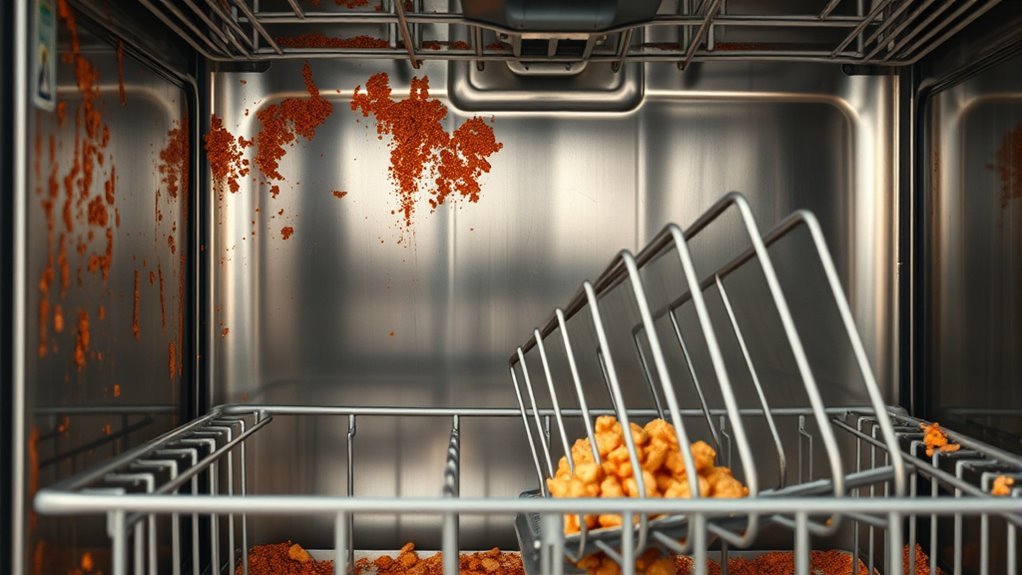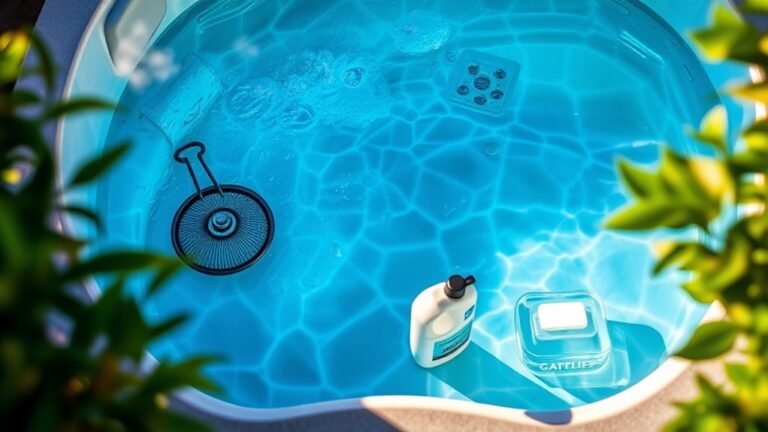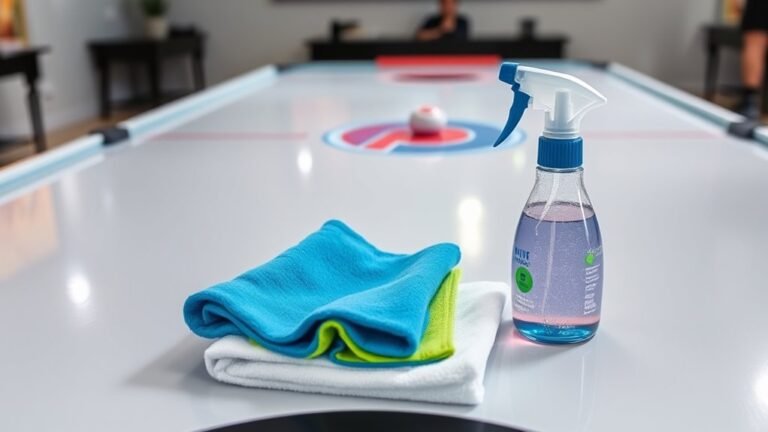Cleaning Mistakes That Damage Your Dishwasher
You’re damaging your dishwasher if you use harsh chemicals that corrode metal parts and seals. Skipping regular cleaning of filters and drains causes clogs and odors, while overloading racks limits water flow and weakens cleaning. Neglecting to clear spray arms leads to mineral buildup and poor spray performance. Also, avoid skipping routine maintenance checks to catch wear or blockages early. Understanding these common mistakes helps protect your dishwasher’s longevity and efficiency.
Using Harsh Chemicals That Corrode Components
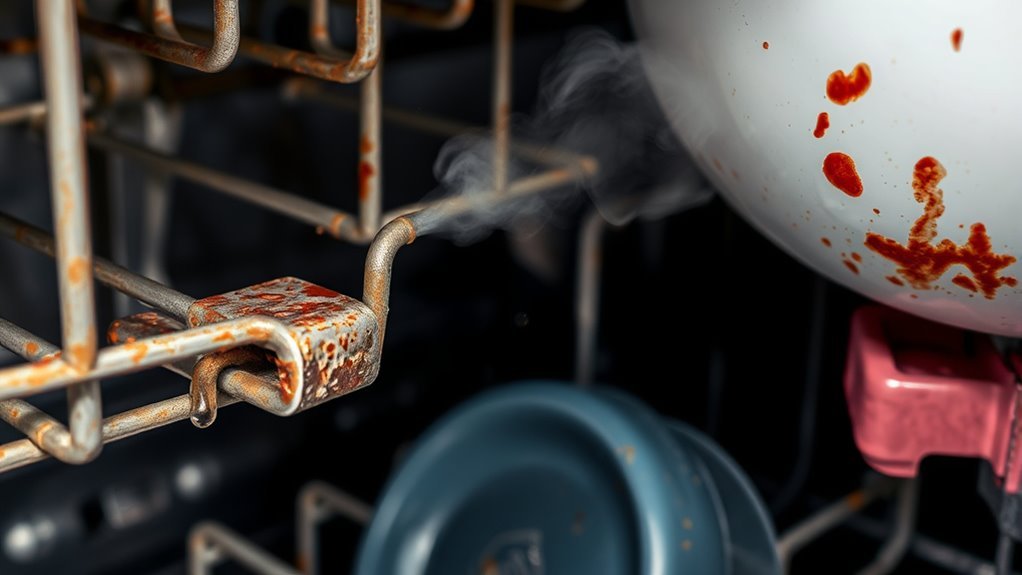
Although it might seem effective, using harsh chemicals to clean your dishwasher can damage its internal components over time. These substances often contain strong acids or alkalis that accelerate corrosion, compromising metal parts and seals essential for peak function. To maintain your dishwasher’s longevity and performance, opt for chemical alternatives designed specifically for corrosion prevention. Enzyme-based or natural cleaners break down residues without harming delicate mechanisms. You should also avoid bleach and abrasive powders, as they deteriorate rubber gaskets and metal surfaces. Adopting safer cleaning agents not only protects your appliance but also frees you from frequent repairs or replacements. Prioritize precision in your maintenance routine by choosing corrosion-preventive solutions tailored for dishwashers, ensuring consistent operation and extended service life. Following manufacturer cleaning routines helps prevent breakdowns and costly repairs, preserving your dishwasher’s functionality.
Ignoring Filter and Drain Cleaning
When you neglect cleaning your dishwasher’s filter and drain, debris buildup can quickly lead to clogs and poor water drainage. Regular filter maintenance and drain inspection are essential to keep your appliance running efficiently and to avoid costly repairs. Without attention, trapped food particles impair water flow, reduce cleaning effectiveness, and may cause unpleasant odors.
| Task | Recommended Frequency |
|---|---|
| Filter Maintenance | Every 1-2 weeks |
| Drain Inspection | Monthly |
| Debris Removal | As needed during checks |
Overloading the Dishwasher Rack
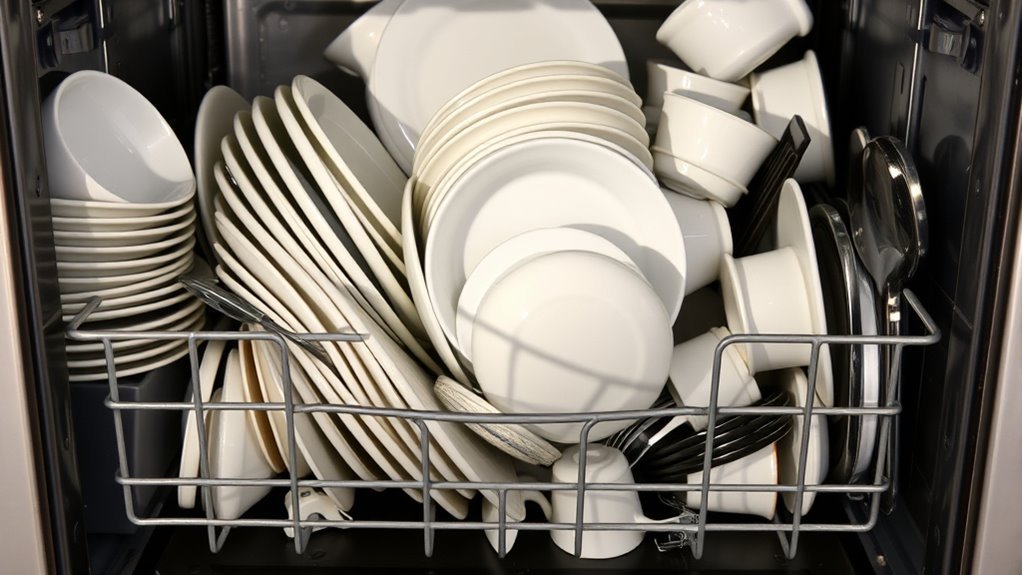
Overloading your dishwasher rack with too many items can compromise its cleaning performance and strain the appliance’s components. When you cram dishes together, water jets can’t reach surfaces effectively, leading to residue buildup and inefficient washing. Proper rack organization guarantees each item is spaced to allow ideal water flow and detergent distribution. You should balance the load distribution across racks to prevent excess weight on any one section, which can damage the rack or spray mechanisms. Avoid stacking items or blocking the detergent dispenser. By maintaining strategic load distribution and thoughtful rack organization, you extend your dishwasher’s lifespan and achieve better cleaning results. Remember, giving your dishwasher room to work freely maximizes its efficiency while protecting its mechanical parts. Regularly inspecting and cleaning the spray arms ensures that water flow remains unobstructed, enhancing cleaning performance.
Neglecting to Clean Spray Arms
If you don’t regularly clean your dishwasher’s spray arms, mineral deposits and food particles can clog the tiny holes, reducing water flow and cleaning efficiency. Neglecting spray arm maintenance compromises your dishwasher’s ability to reach all surfaces evenly, leading to poor washing results and potential buildup inside the appliance. To maintain peak performance, remove and inspect the spray arms at least once a month. Use a toothpick or small brush to clear blockages from each nozzle carefully. Soak the arms in a vinegar solution if mineral deposits are stubborn. Following this cleaning frequency guarantees unrestricted water jets, prolongs the dishwasher’s lifespan, and keeps your dishes spotless. Regular spray arm maintenance is essential if you want to avoid costly repairs and maintain your freedom from manual dishwashing.
Skipping Regular Maintenance Checks
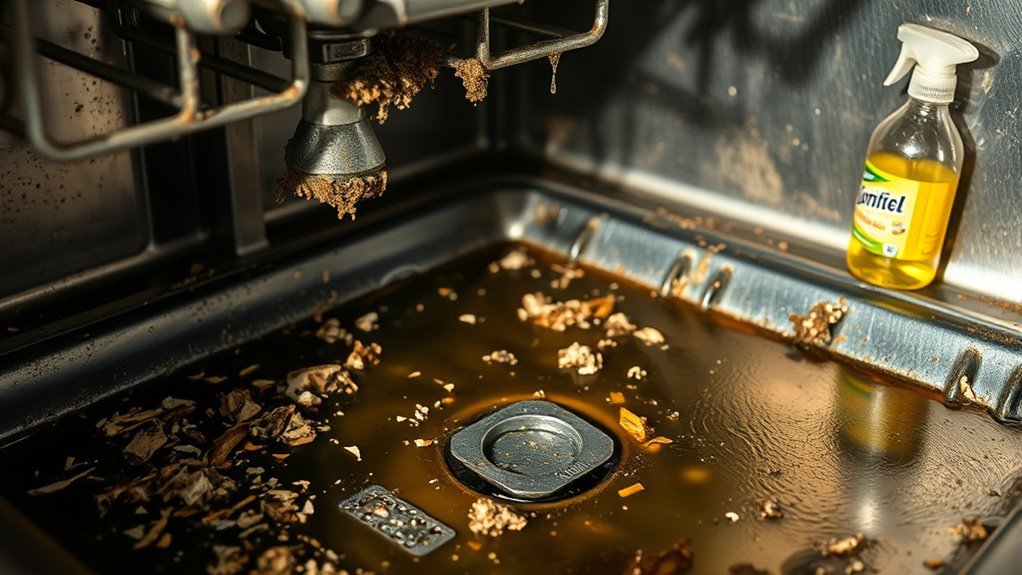
Although it might seem tedious, skipping regular maintenance checks can considerably reduce your dishwasher’s efficiency and lifespan. You need to adhere to a maintenance schedule that includes regular inspections of key components like filters, spray arms, and seals. These inspections help identify early signs of wear, blockages, or mineral buildup that impair performance. Ignoring this routine risks costly repairs and inefficient water and energy use, limiting your operational freedom with the appliance. By performing scheduled maintenance, you guarantee ideal water flow, prevent clogs, and maintain effective cleaning cycles. Staying proactive with regular inspections ultimately extends your dishwasher’s service life and maintains peak performance, freeing you from unexpected breakdowns and preserving your convenience. Don’t underestimate the power of a disciplined maintenance schedule to keep your dishwasher running smoothly. Cleaning the dishwasher filters regularly is a crucial part of this maintenance to prevent odors and boost performance.
Frequently Asked Questions
Can Using Vinegar Damage My Dishwasher’S Rubber Seals?
You might wonder about vinegar effects on your dishwasher’s rubber seals. While vinegar is a popular natural cleaner, its acidic nature can degrade rubber seals over time, causing them to become brittle or cracked. To protect those seals, avoid frequent or undiluted vinegar use. Instead, opt for dishwasher-safe cleaners designed to maintain seal integrity. This approach keeps your dishwasher running smoothly without compromising the rubber components’ lifespan.
How Often Should I Replace the Dishwasher’S Detergent Dispenser?
Think of your dishwasher’s detergent dispenser as the heart pumping cleaning power through your machine. You should replace it when you notice cracks, leaks, or if detergent quality drops due to buildup—typically every 3-5 years. The dispenser lifespan depends on usage frequency and detergent type. To keep your dishwasher running freely and effectively, inspect it regularly and opt for high-quality detergents, which reduce wear and prolong the dispenser’s reliable performance.
Is It Safe to Run the Dishwasher Empty for Cleaning?
Yes, running an empty cycle is safe and often recommended for maintaining your dishwasher. It helps remove food debris, grease, and buildup, improving cleaning effectiveness. For best results, use a dishwasher cleaner or a cup of white vinegar placed on the lower rack during the empty cycle. This practical step guarantees your machine stays fresh and efficient without risking damage or wasting water and detergent unnecessarily.
What Are the Signs My Dishwasher Needs Professional Repair?
If you notice leaking water around your dishwasher, it’s a clear sign you need professional repair to prevent further damage. Strange noises during cycles, like grinding or squealing, also indicate mechanical issues that require expert attention. Additionally, if your dishwasher isn’t cleaning properly or drains slowly, it’s time to call a technician. Addressing these problems promptly helps you maintain your appliance’s freedom to perform efficiently without unexpected breakdowns.
Can Hard Water Cause Damage to Dishwasher Components?
Yes, hard water effects can cause significant damage to your dishwasher components over time. Mineral deposits from hard water build up on heating elements, spray arms, and filters, reducing efficiency and causing wear. To maintain your dishwasher, prioritize regular dishwasher maintenance like using water softeners or descaling agents. This keeps your appliance running smoothly and extends its lifespan, giving you the freedom to enjoy hassle-free cleaning without frequent repairs.
